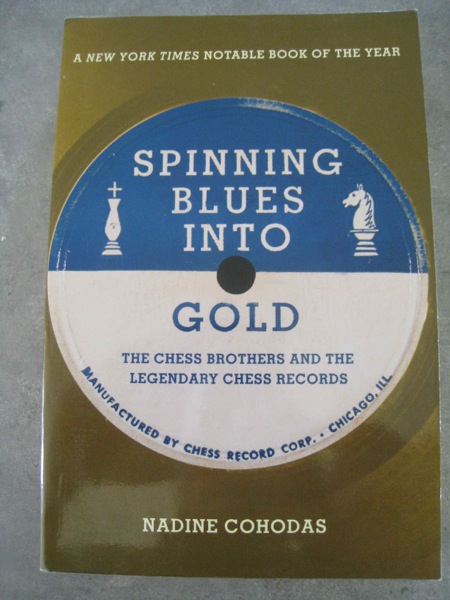Nadine Cohodas Spinning Blues Into Gold: The Chess Brothers and the Legendary Chess Records

No matter how well you know the story, a fan will always be tempted by anything that purports to tell the story behind the story and when the story involves a record label that gave us the classic recordings of of Muddy Waters, Little Walter, Howlin' Wolf, Willie Dixon, Chuck Berry and Etta James you can expect to find all sorts of interesting details as a skilled narrator fills in the background to familiar territory.
In many cases that works best when the narrator was intimately involved with the actual events that are being chronicled, as is the case with Joe Boyd's White Bicycles or the video documentary Tom Dowd and the Sound of Music, but on the other hand there are a multitude of cases where that first person narrative isn't going to happen.
While the two brothers who arrived in the United States as immigrants in 1928 could have told an intriguing story that transformed an interest in a liquor store on Chicago's south side into one of the world's most influential record labels it's probably best that the task of chronicling the story be passed to an independent observer rather than an active participant.
It's not, after all, as if the story of Chess Records is lacking in stories that may well have been apocryphal, and it's one of those stories where your point of view is going to depend on where you stand relative to the emerging narrative.
When it comes to a matter like the appropriate level of royalties that should be payable and the amount of money that found its way to the artists, Phil and Leonard Chess would have a radically different viewpoint to, say, Chuck Berry, Bo Diddley or Muddy Waters, and I suspect that none of their views would have been totally convergent either.
When it comes to untangling and then reintegrating the strands of the story, Cohodas does an exemplary job. One suspects that the experience involved in producing titles like Strom Thurmond and the Politics of Southern Change or The Band Played Dixie: Race and the Liberal Conscience at Ole Miss would have something to do with that. It's not as if either of those two previous publications would have involved a straightforward narrative.
In a nutshell, the story goes like this. Following their father across the Atlantic to Chicago in 1928, the Chess brothers start off working in his junkyard before taking over a liquor store in the heart of the windy city's black community, where the juke box in the corner pumps out a solid serve of blues. Moving on to the Macomba Lounge, which becomes a favorite after-hours spot for blues musicians, the brothers hook up with a record company called Aristocrat, and a guitarist named McKinley Morganfield, who the world now knows as Muddy Waters.
After the brothers bought the label in 1949, and changed the name to Chess Records a succession of successful jazz and blues recordings are followed by some of the best early rock and roll in the form of Chuck Berry and Bo Diddley.
And who achieves this?
Two brothers who never played a musical instrument, had no experience in the music industry and no prior exposure to the blues. What they did have was an insurmountable desire to succeed and an instinctive sense of areas where there's money to be made.
In among the details of the rapidly growing Chess stable of labels we learn of the brothers' involvement in record pressing, distribution and even the radio stations that played the records. While they didn't actually make and record the music in the studio, they supervised the process, made the odd suggestion, and once the product was ready got it out the door and into a marketplace they knew intimately.
Given the amount of preconception, myth, misinformation and selective memory involved in the strands of the story Cohodas has done a remarkable job of weighing the available evidence to present what seems like an objective assessment.
As an account of entrepreneurial enterprise, Spinning Blues into Gold is a fascinating read, and as a chronicle of the development of Chicago blues and rock 'n' roll it's an invaluable resource. In short, an impeccably researched volume that'll be retaining a slot on Hughesy's bookshelves well past the foreseeable future.

